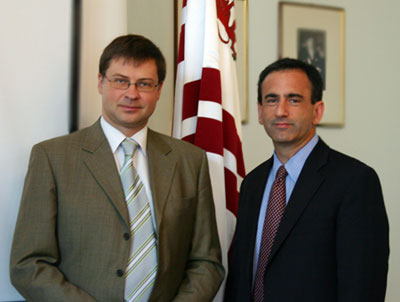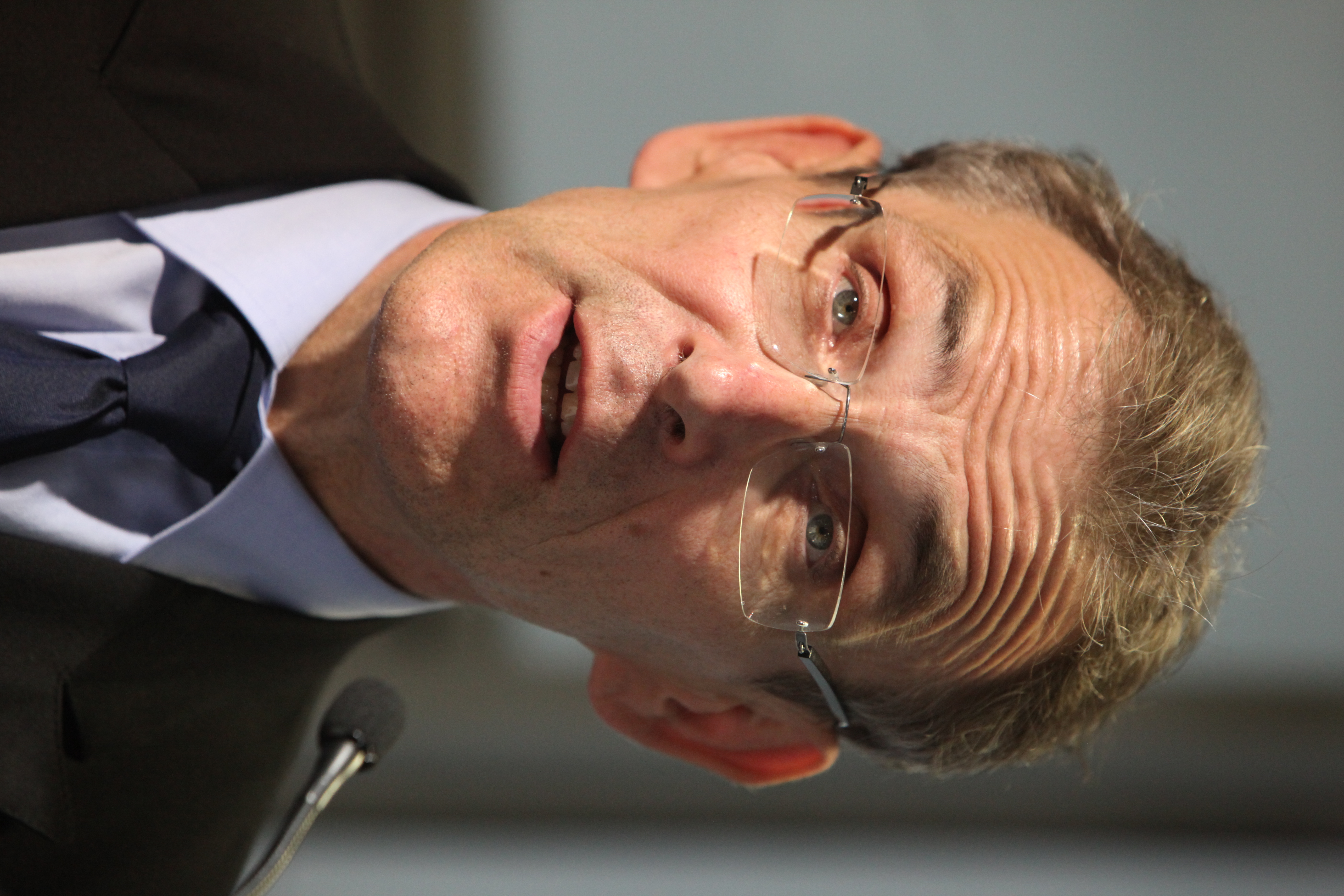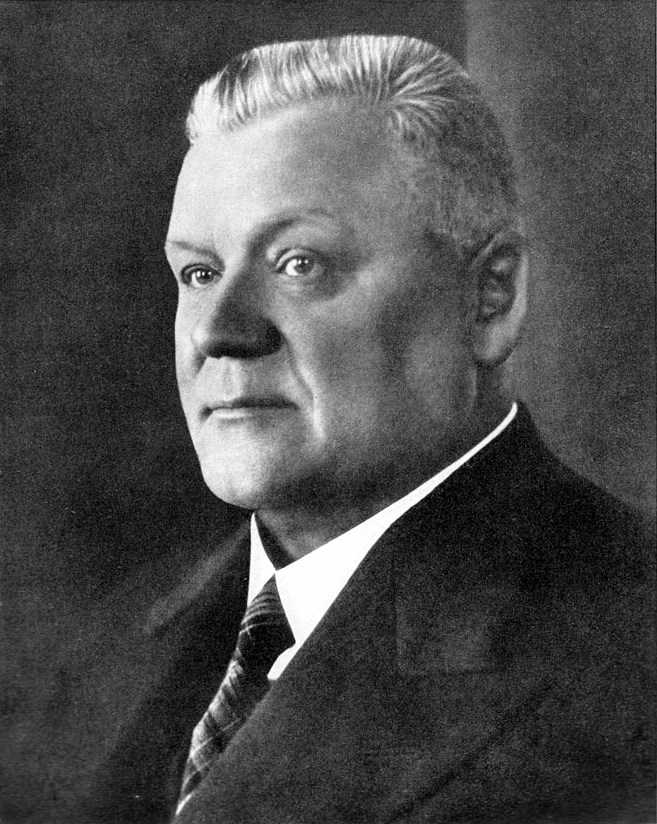|
Unity (Latvian Political Party)
Unity ( lv, Vienotība, V) is a liberal-conservative political party in Latvia. It is a member of the New Unity alliance and is positioned on the centre-right on the political spectrum. It was formed in 2010 as an electoral alliance and in 2011, it was registered as a political party. It was the leading party in the Dombrovskis and Straujuma cabinets from its inception in 2010 until February 2016; it is a member of the current coalition since January 2019 with its member Krišjānis Kariņš as Prime Minister. Unity is a member of the European People's Party (EPP). Since 2017, its chairman of the Main Board has been the former Minister for Economics of Latvia, Arvils Ašeradens, who succeeded former European Commissioner Andris Piebalgs. History Origins, governing and coalition party (2010–2018) The party was founded as an electoral alliance of the New Era Party, Civic Union, and the Society for Political Change on 6 March 2010. It was reportedly founded in a bid to ... [...More Info...] [...Related Items...] OR: [Wikipedia] [Google] [Baidu] |
Valdis Dombrovskis
Valdis Dombrovskis (born 5 August 1971) is a Latvian politician serving as Executive Vice President of the European Commission for An Economy that Works for People since 2019 and European Commissioner for Trade since 2020. He previously served as European Commissioner for Financial Stability, Financial Services and Capital Markets Union from 2016 to 2020 and Prime Minister of Latvia from 2009 to 2014. Dombrovskis served as Minister for Finance of Latvia from 2002 to 2004. He then served as a Member of the European Parliament (MEP) for the New Era Party from 2004 to 2009. He became the Prime Minister of Latvia 2009, serving until his resignation in 2014. He was Vice-President of the European Commission for the Euro and Social Dialogue from 2014 to 2019. Following the resignation of Lord Jonathan Hill, Dombrovskis served as European Commissioner for Financial Stability, Financial Services and the Capital Markets Union from 2016 to 2020. Following the resignation of Phil Hoga ... [...More Info...] [...Related Items...] OR: [Wikipedia] [Google] [Baidu] |
Administrative Divisions Of Latvia
The current administrative division of Latvia came into force on 1 July 2021. On 10 June 2020, the Saeima approved a municipal reform that would reduce the 110 municipalities and nine republic cities to 43 local government units consisting of 36 municipalities (''novadi'') and seven state cities (''valstspilsētas, plural''). On 1 June 2021, the Constitutional Court of Latvia ruled that the annexation of Varakļāni Municipality to Rēzekne Municipality was unconstitutional. In response, the Saeima decided to preserve the existence of Varakļāni Municipality as a 43rd local government unit. Previous municipal reforms after the restoration of Latvian independence were enacted in 2009 and 1990 (when parishes were restored). State cities with independent governments as of 2021 The 2020 law on administrative territories and populated areas designated Ogre and the previous nine republic cities as state cities. It also provided for the promotion of Iecava and Koknese to state cit ... [...More Info...] [...Related Items...] OR: [Wikipedia] [Google] [Baidu] |
Harmony Centre
;russian: Достойная жизнь для каждого) , website saskanascentrs.lv Harmony Centre ( lv, Saskaņas Centrs, SC; russian: Центр Cогласия, ЦC) was a social democracy, social-democratic political alliance in Latvia. It originally consisted of five political parties: the National Harmony Party, the Socialist Party of Latvia, New Centre (Latvia), New Centre, the Daugavpils City Party, and the Social Democratic Party (Latvia), Social Democratic Party. Through a series of mergers they were eventually reduced to two: Social Democratic Party "Harmony" and the Socialist Party. Ideologically a Big tent, catch-all grouping of centre-left and left-wing parties, the alliance also aimed to represent the interests of Russians in Latvia. History Founded on 9 July 2005, Harmony Centre emerged from For Human Rights in a United Latvia, an electoral alliance formed by the National Harmony Party, the Socialist Party and Equal Rights (Latvia), Equal Rights, that ... [...More Info...] [...Related Items...] OR: [Wikipedia] [Google] [Baidu] |
Society For Political Change
The Society for Political Change (, SCP) was a social-liberal political party in Latvia founded on 6 September 2008. Its members include two former ministers, former foreign minister Artis Pabriks and former economics minister Aigars Štokenbergs; its first president was economist Gatis Kokins. The SCP ran as part of the Unity rainbow party alliance in the 2010 parliamentary election to the Saeima. The party won six seats, out of the list's total of 33. After the election, the SCP demanded that the right-wing National Alliance, which includes previous coalition partners For Fatherland and Freedom/LNNK, be excluded from the new government, which included Unity and the Union of Greens and Farmers. On 6 August 2011, it merged with two other parties to form the new political party Unity Unity may refer to: Buildings * Unity Building, Oregon, Illinois, US; a historic building * Unity Building (Chicago), Illinois, US; a skyscraper * Unity Buildings, Liverpool, UK; two buildings ... [...More Info...] [...Related Items...] OR: [Wikipedia] [Google] [Baidu] |
Electoral Alliance
An electoral alliance (also known as a bipartisan electoral agreement, electoral pact, electoral agreement, electoral coalition or electoral bloc) is an association of political parties or individuals that exists solely to stand in elections. Each of the parties within the alliance has its own policies but chooses temporarily to put aside differences in favour of common goals and ideology in order to pool their voters' support and get elected. On occasion, an electoral alliance may be formed by parties with very different policy goals, which agree to pool resources in order to stop a particular candidate or party from gaining power. Unlike a coalition formed after an election, the partners in an electoral alliance usually do not run candidates against one another but encourage their supporters to vote for candidates from the other members of the alliance. In some agreements with a larger party enjoying a higher degree of success at the polls, the smaller party fields candidate ... [...More Info...] [...Related Items...] OR: [Wikipedia] [Google] [Baidu] |
The Baltic Times
''The Baltic Times'' is an independent monthly newspaper that covers the latest political, economic, business, and cultural events in Estonia, Latvia and Lithuania. The paper was formed from a merger in 1996 of the ''Baltic Independent'' and ''Baltic Observer''. With offices in Tallinn and Vilnius and its headquarters in Riga, ''The Baltic Times'' remains the only English language print and online newspaper covering all three Baltic states The Baltic states, et, Balti riigid or the Baltic countries is a geopolitical term, which currently is used to group three countries: Estonia, Latvia, and Lithuania. All three countries are members of NATO, the European Union, the Eurozone, .... Between 1996 and 2012 ''The Baltic Times'' was published weekly and then, until September 2013, twice a month. Official website
|
Andris Piebalgs
Andris Piebalgs (born 17 September 1957) is a Latvian politician and diplomat who served as European Commissioner for Development at the European Commission from 2010 until 2014. Between 2004 and 2009 he served as Commissioner for Energy. Between 4 June 2016 and 19 August 2017, he served as the leader of the Unity party. Career Andris Piebalgs was born on 17 September 1957 in Valmiera, Latvia. Piebalgs is a graduate in Physics from the University of Latvia. Andris Piebalgs is an experienced Latvian politician who occupied key positions in both national and European political fields. Earlier in his career, while Latvia was still part of the Soviet Union, Andris Piebalgs worked as a teacher and was the headmaster of the 1st Secondary School of Valmiera (1980–1990). He also served as director of the department in the Ministry of Education in Latvia. He was a member of Communist Party of Soviet Union from 1979. In 1988, Latvian People's Front, an organisation that united more ... [...More Info...] [...Related Items...] OR: [Wikipedia] [Google] [Baidu] |
Ministry Of Economics (Latvia)
The Ministry of Economics of the Republic of Latvia ( lv, Latvijas Republikas Ekonomikas ministrija) is the leading state administrative institution responsible for economic policy in Latvia. The ministry also represents the economic interests of Latvia in the European Union. Minister for Economics The current minister since May 26, 2022, is Ilze Indriksone from the National Alliance. Functions The ministry develops and implements economic structural policy, manufacturing policy, energy policy, external economic policy, domestic market policy (for goods and services), commercial development policy, competitiveness and technological development policy, consumer rights protection policy, and construction and housing policy. To achieve these ends, the ministry works closely with non-governmental organizations representing entrepreneurs and other social partners. EU Structural Funds The Ministry of Economics is also responsible for introducing and supervising programs and projects ... [...More Info...] [...Related Items...] OR: [Wikipedia] [Google] [Baidu] |
Prime Minister Of Latvia
The prime minister of Latvia ( lv, ministru prezidents) is the most powerful member of the Government of Latvia, who presides over the Latvian Cabinet of Ministers. The officeholder is nominated by the president of Latvia, but must be able to obtain the support of a parliamentary majority in the Saeima. The tables below display all Latvian prime ministers from both the first period of Latvian independence (1918–1940) and since the country regained its independence (1990–present). From 1990 to 6 July 1993, the head of government was known as the chairman of the Council of Ministers. A direct translation of the official Latvian term is minister-president. Although the equivalent is used in some European languages, it is not used conventionally in English. List 1918-1940 Political Party: 1940-1990 JANIS (VILIS) LACIS (1940-1959) Jānis Peive (1959-1963) Vitālijs Rubenis (1963-1970) Jurijs Rubenis (1970-1988) Vilnis Edvīns Bresis (1988-1990) 1990-present ... [...More Info...] [...Related Items...] OR: [Wikipedia] [Google] [Baidu] |
Government Of Latvia
200px, Meeting room of the Government of Latvia in the Palace of Justice The Government of Latvia is the central government of the Republic of Latvia. The Constitution of Latvia ( lv, Satversme) outlines the nation as a parliamentary republic represented by a unicameral parliament (Saeima) and the Cabinet of Ministers of the Republic of Latvia ( lv, Latvijas Republikas Ministru kabinets), which form the executive branch of the Government of Latvia. Since the early 2000s cabinet meetings in Latvia have been open to the public. In June 2013, the Latvian government became one of the first in Europe to offer live internet broadcasts of cabinet meetings. Current Cabinet of Ministers The incumbent cabinet is the Kariņš cabinet since 23 January 2019. List of governments File:Gabinete de Ministerios de Letonia, Riga, Letonia, 2012-08-07, DD 01.JPG, Cabinet of Ministers building (the Palace of Justice) co-located with the Supreme Court A supreme court is the highest c ... [...More Info...] [...Related Items...] OR: [Wikipedia] [Google] [Baidu] |
Laimdota Straujuma
Laimdota Straujuma (born 24 February 1951) is a Latvian economist who was the Prime Minister of Latvia from January 2014 to February 2016. Before her tenure as Prime Minister, she served as Minister of Agriculture from 2011 to 2014. She was the first woman to serve as the head of government of the country. After her resignation on 7 December 2015, she announced her intention to resume a seat in the Saeima. Between October 2000 and 2006, Straujuma served as the Secretary of State of the Ministry for Agriculture. Between 2007 and 2010, she was the Secretary of State of the Ministry for Regional Development and Local Government. She was appointed as Minister of Agriculture on 25 October 2011. On 5 January 2014, the Unity Party nominated Straujuma as a candidate for the post of Prime Minister following the resignation of Valdis Dombrovskis. The nomination was supported by Unity's coalition partners, the Reform Party and the National Alliance, as well as the opposition Union of Gree ... [...More Info...] [...Related Items...] OR: [Wikipedia] [Google] [Baidu] |




